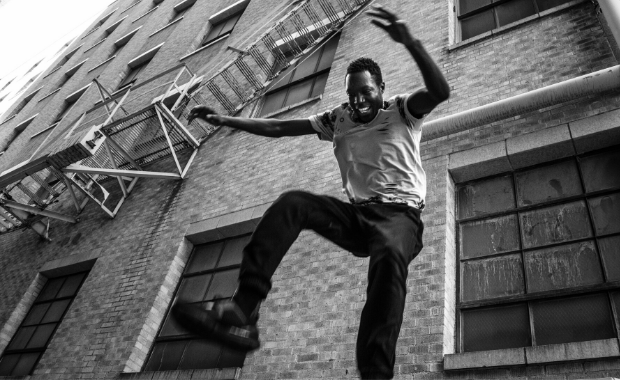Life
The 7 Things that Are Preventing You from Enjoying Life to the Fullest

If you’d like to learn how to live each moment to the fullest and succeed in all aspects of your life so you can be happy, sign up for the free 90-Day Master Class hosted by the founder of Addicted2Success.com, Joel Brown.
To some people, life is unfair. To some, life is good. And to others, life is great. It all depends on your perspective and how much responsibility you take for your personal development and income.
But regardless of how we see life, we all want the same thing – to live each moment to the fullest. It doesn’t matter if you are the richest person alive or the poorest. It doesn’t matter whether you’re the happiest person on earth or the saddest, we all want to enjoy life to the fullest.
The problem is – there are some things hindering us from this goal that our mind is hiding from us. It might be difficult to discover these things on your own, but if you don’t just want to exit, but also live; if you don’t just want to survive, but also thrive, you must get rid of these things.
Today we will examine the 7 things that are preventing you from living each moment to the fullest and how to break free from them:
1. Trying to Please Everyone
There are many reasons this is futile. The dominant one is that you’ll never be happy being someone else because you’ll put yourself under immense pressure trying to pull it off. And when it’s all been said and done, you still won’t be able to please everybody because different people want different things for you. The question is – what do you want for yourself?
The second reason is even worse for life-changing decisions like career, business, or marriage. The people you’re trying to please won’t suffer the consequences with you daily. They won’t be the ones going about with the burden of that poor decision. In fact, you might end up resenting them for the poor decisions you made to please them.
If you always try to please everyone, you will never, ever enjoy life to the fullest.
2. Waiting for Permission
If you think someone won’t give you their blessing to do what is really important to you, don’t go to them to ask for permission. Just do it anyway and apologize later if need be. If it is so important to you, then do it. You have to be bold enough to stand up for yourself.
“Do what makes YOU happy. Focus on what brings YOU joy. Appreciate and do more things that make YOU smile. Live your life for yourself. You matter! You count! You’re deserving of true happiness! This is YOUR life. Live it to the fullest! Live life with no regrets.” – Stephanie Lahart
3. Waiting for the Right Time
The problem with waiting for the right time is – it never comes. Weeks will pass, then months, and even years, and you will always find an excuse to procrastinate. Then you will regret not starting now.
The right time is now; when you have the motivation. Happiness isn’t something you can find, you have to create it. And if you do that, years will pass by and you would be happy that you started now.
Sure it might not go as expected, but as Mark Twain Said, “Twenty years from now, you will be disappointed more by the things you didn’t do than by the things you do.”
4. Comparing Yourself to Others
The danger of comparing yourself to others is that you might think you’re doing so well that you’ll relax too much. Or you might find out that the people you’re comparing yourself to are miles ahead of you and you might get discouraged.
Sure, you should be competing with someone; but that person isn’t your someone else rather than the person you were yesterday. As long as you do better today than you did yesterday, and you do that every day, you are already successful.
“A flower does not think of competing to the flower next to it, it just blooms.” – Zen Shin
5. Taking Self-Education Lightly
A wise man, Jim Rohn, once said, “formal education will make you a living. Self-education will make you a fortune.” and there’s a lot of truth in that.
They don’t teach you the concept of lifestyle design for absolute freedom in school. You can only learn that by reading books (or listening to audiobooks) like the 4-hour workweek by Tim Ferriss.
In school, they don’t teach you the life-changing concept of goal setting. But you can learn from books like Goals! By Brian Tracy; that shows you how to achieve everything you want faster than you ever thought possible. Let’s say you wanted to start a YouTube channel that motivates others: you’d need to be educating yourself on your audience, learning how to design thumbnails, and figuring out the ins and outs of video production. Although this would take time, the benefits could massively outweigh the waiting game.
Your parents might not teach you how to achieve financial freedom (maybe they aren’t financially independent themselves); but you can learn something like that in Rich Dad, Poor Dad by Robert Kiyosaki.
The point is, it doesn’t matter whether you are a doctor who also wants to do better; a businessman who wants to get ahead faster; or a person who just wants to live happier, there are blogs, books, podcasts, and other things out there that can save you years of hard work and learning the hard way.
As the popular saying goes, knowledge is power.
6. Being Afraid of Failure
Many people are afraid of failure because they think it’s a bad thing. But failure gives you experience, which they say, is the best teacher. It teaches you everything you need to succeed. Plus, you can use Tim Ferriss’ fear setting to master it.
You can also avoid failure easily if you love self-education – aka learning from history. And finally, you can overcome it if you are willing to live with the possibility of failure and you plan to learn from it to become smarter.
7. Missing out on the Benefits of Meditation
Some people think they don’t have time for meditation. But given the fact that it literally increases focus and attention, reduces stress, preserves the aging brain, physically changes the brain structure for the better, reduces anxiety and depression, helps overcome addictions, and has a bunch of other benefits; I think it is safe to say that you don’t have the time not to meditate.
And Don’t Forget to do This
Define what success means to you. To some people, it means becoming rich and living the billionaire lifestyle. Some people just want to climb to the top of the corporate ladder, have a wonderful family, and live happily ever after. Some people would love to join or create their own NGO to achieve a higher purpose.
But all that doesn’t matter. All that matters is that you know exactly what it is you want to do with your life. You need to define success in your own terms. What does success mean to you? Use your answer to devise a plan to make it happen.
It will make your life a lot easier and your decision making swift every time. So the next time you have a big decision to make, you can ask yourself, does it take me closer to my goal? Or farther from it?
What activity makes you enjoy your life to the fullest? Share your thoughts with us below!
Did You Know
How Skilled Migrants Are Building Successful Careers After Moving Countries
Behind every successful skilled migrant career is a mix of resilience, strategy, and navigating systems built for locals.

Moving to a new country for work is exciting, but it can also be unnerving. Skilled migrants leave behind familiar systems, networks, and support to pursue better job opportunities and a better future for their families. (more…)
Life
10 Research-Backed Steps to Create Real Change This New Year
This New Year could finally be the one where you break old patterns and create real, lasting change.

Every New Year, we make plans and set goals, but often repeat old patterns. (more…)
Life
9 Harsh Truths Every Young Man Must Face to Succeed in the Modern World
Before chasing success, every young man needs to face these 9 brutal realities shaping masculinity in the modern world.

Many young men today quietly battle depression, loneliness, and a sense of confusion about who they’re meant to be.
Some blame the lack of deep friendships or romantic relationships. Others feel lost in a digital world that often labels traditional masculinity as “toxic.”
But the truth is this: becoming a man in the modern age takes more than just surviving. It takes resilience, direction, and a willingness to grow even when no one’s watching.
Success doesn’t arrive by accident or luck. It’s built on discipline, sacrifice, and consistency.
Here are 9 harsh truths every young man should know if he wants to thrive, not just survive, in the digital age.
1. Never Use Your Illness as an Excuse
As Dr. Jordan B. Peterson often says, successful people don’t complain; they act.
Your illness, hardship, or struggle shouldn’t define your limits; it should define your motivation. Rest when you must, but always get back up and keep building your dreams. Motivation doesn’t appear magically. It comes after you take action.
Here are five key lessons I’ve learned from Dr. Peterson:
-
Learn to write clearly; clarity of thought makes you dangerous.
-
Read quality literature in your free time.
-
Nurture a strong relationship with your family.
-
Share your ideas publicly; your voice matters.
-
Become a “monster”, powerful, but disciplined enough to control it.
The best leaders and thinkers are grounded. They welcome criticism, adapt quickly, and keep moving forward no matter what.
2. You Can’t Please Everyone And That’s Okay
You don’t need a crowd of people to feel fulfilled. You need a few friends who genuinely accept you for who you are.
If your circle doesn’t bring out your best, it’s okay to walk away. Solitude can be a powerful teacher. It gives you space to understand what you truly want from life. Remember, successful men aren’t people-pleasers; they’re purpose-driven.
3. You Can Control the Process, Not the Outcome
Especially in creative work, writing, business, or content creation, you control effort, not results.
You might publish two articles a day, but you can’t dictate which one will go viral. Focus on mastery, not metrics. Many great writers toiled for years in obscurity before anyone noticed them. Rejection, criticism, and indifference are all part of the path.
The best creators focus on storytelling, not applause.
4. Rejection Is Never Personal
Rejection doesn’t mean you’re unworthy. It simply means your offer, idea, or timing didn’t align.
Every successful person has faced rejection repeatedly. What separates them is persistence and perspective. They see rejection as feedback, not failure. The faster you learn that truth, the faster you’ll grow.
5. Women Value Comfort and Security
Understanding women requires maturity and empathy.
Through books, lectures, and personal growth, I’ve learned that most women desire a man who is grounded, intelligent, confident, emotionally stable, and consistent. Some want humor, others intellect, but nearly all want to feel safe and supported.
Instead of chasing attention, work on self-improvement. Build competence and confidence, and the rest will follow naturally.
6. There’s No Such Thing as Failure, Only Lessons
A powerful lesson from Neuro-Linguistic Programming: failure only exists when you stop trying.
Every mistake brings data. Every setback builds wisdom. The most successful men aren’t fearless. They’ve simply learned to act despite fear.
Be proud of your scars. They’re proof you were brave enough to try.
7. Public Speaking Is an Art Form
Public speaking is one of the most valuable and underrated skills a man can master.
It’s not about perfection; it’s about connection. The best speakers tell stories, inspire confidence, and make people feel seen. They research deeply, speak honestly, and practice relentlessly.
If you can speak well, you can lead, sell, teach, and inspire. Start small, practice at work, in class, or even in front of a mirror, and watch your confidence skyrocket.
8. Teaching Is Leadership in Disguise
Great teachers are not just knowledgeable. They’re brave, compassionate, and disciplined.
Teaching forces you to articulate what you know, and in doing so, you master it at a deeper level. Whether you’re mentoring a peer, leading a team, or sharing insights online, teaching refines your purpose.
Lifelong learners become lifelong leaders.
9. Study Human Nature to Achieve Your Dreams
One of the toughest lessons to accept: most people are self-interested.
That’s not cynicism, it’s human nature. Understanding this helps you navigate relationships, business, and communication more effectively.
Everyone has a darker side, but successful people learn to channel theirs productively into discipline, creativity, and drive.
Psychology isn’t just theory; it’s a toolkit. Learn how people think, act, and decide, and you’ll know how to lead them, influence them, and even understand yourself better.
Final Thoughts
The digital age offers endless opportunities, but only to those who are willing to take responsibility, confront discomfort, and keep improving.
Becoming a man today means embracing the hard truths most avoid.
Because at the end of the day, success isn’t about luck. It’s about who you become when life tests you the most.
Change Your Mindset
The Four Types of Happiness: Which One Are You Living In?
Most people chase success only to find emptiness, this model reveals why true happiness lies somewhere else.

In a world driven by rapid technological growth and constant competition, many people unknowingly trade joy for achievement. (more…)
-

 Health & Fitness2 weeks ago
Health & Fitness2 weeks agoWhat Minimalism Actually Means for Your Wellness Choices
-

 News1 week ago
News1 week agoBrandon Willington Builds 7-Figure Business by Ignoring Almost Everything
-

 Did You Know2 weeks ago
Did You Know2 weeks agoWhy Most Online Courses Fail and How to Fix Them
-

 Business2 weeks ago
Business2 weeks agoIf Your Business Internet Keeps Letting You Down, Read This
-

 Business1 day ago
Business1 day agoEntrepreneur’s Guide to Pay Stubs: Why Freelancers and Small Business Owners Need a Smart Generator
























